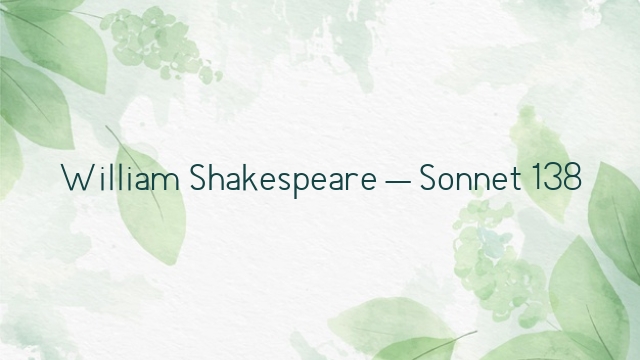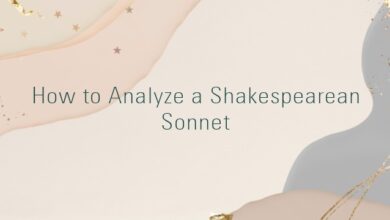
William Shakespeare – Sonnet 138
When my love swears that she is made of truth,
I do believe her though I know she lies,
That she might think me some untutored youth,
Unlearned in the world’s false subtleties.
Thus vainly thinking that she thinks me young,
Although she knows my days are past the best,
Simply I credit her false-speaking tongue:
On both sides thus is simple truth suppressed:
But wherefore says she not she is unjust?
And wherefore say not I that I am old?
O! love’s best habit is in seeming trust,
And age in love, loves not to have years told:
Therefore I lie with her, and she with me,
And in our faults by lies we flattered be.
The sonnet continues the contradictions of the previous one. In 137 his heart believes one thing, (that she is his alone), but knows that it is not true, while his eyes also, seeing a certain fact, refuse to acknowledge that it is true. Here the poet insists on believing something which he knows to be untrue. The poem hinges on the various meanings of ‘to lie’: the obvious one of telling untruths, and the less direct one of deceiving oneself; ending with a a third meaning of ‘to sleep with’, ‘to have sex with’. This gives the more realistic motivation for lover and beloved behaving as they do to each other, and lying in their hearts for comfort and pleasure’s sake.
The opening line sets the scene by suggesting that there is a need to patch up the loving relationship, the woman having to swear that she is true, implying that doubt has arisen, and the poet having to pretend that he is younger than he is for fear of losing her. The basis for love is therefore flawed and the love between them mirrors the flaws in their characters. Nevertheless they seem to reach a plateau of relative contentment, and can almost enjoy the game of deception.
This sonnet and 144 were both printed in The Passionate Pilgrim, a collection of 20 poems which appeared in 1599, published by William Jaggard. It is generally thought to have been a pirated edition, unauthorised by Shakespeare, although the title page claims that it is “By W. Shakespeare.” Three lyrics from Love’s Labours Lost are included in the collection, the other poems being of uncertain authorship, although it is thought that some of the others might well be by him (e.g. Crabbed age and youth / Cannot live together.). Below is the version of 138 that appears in Jaggard’s book. Opinion is divided as to the relative merits of each version, but many commentators think that the Q version is an improved re-working of the original 1599 (or earlier) version.
When my love sweares that she is made of truth,
I do beleeue her (though I know she lies)
That she might thinke me some vntutor’d youth,
Vnskilful in the worlds false forgeries.
Thus vainly thinking that she thinkes me young,
Although I know my yeares be past the best :
I smiling, credite her false speaking tounge,
Outfacing faults in loue, with loues ill rest.
But wherefore sayes my loue that she is young ?
And wherefore say not I that I am old :
O, Loues best habit’s in a soothing toung,
And Age in loue, loues not to haue yeares told.
Therefore I’le lye with Loue, and loue with me,
Since that our faultes in louve thus smother’d be.
The 1609 Quarto Version
WHen my loue ſweares that ſhe is made of truth,
I do beleeue her though I know ſhe lyes,
That ſhe might thinke me ſome vntuterd youth,
Vnlearned in the worlds falſe ſubtilties.
Thus vainely thinking that ſhe thinkes me young,
Although ſhe knowes my dayes are paſt the beſt,
Simply I credit her falſe ſpeaking tongue,
On both ſides thus is ſimple truth ſuppreſt :
But wherefore ſayes ſhe not ſhe is vniuſt ?
And wherefore ſay not I that I am old ?
O loues beſt habit is in ſeeming truſt,
And age in loue,loues not t’haue yeares told.
Therefore I lye with her,and ſhe with me,
And in our faults by lyes we flattered be.
Commentary
1. When my love swears that she is made of truth,made of truth = all truthfulness; faithful in love; unable to lie. With a pun also on ‘maid of truth’, a true virgin.2. I do believe her though I know she lies,There may be a religious connection in this idea of believing what one knows to be impossible. At about this period the doctrine was advanced that the more preposterous Christian truth was, the greater was the act of faith in believing it, and therefore the greater were one’s merits in the eyes of Christ the Redeemer in making the act of faith. Here the lover is compelling himself to believe what he knows (by a sixth sense?) to be untrue, that his mistress is faithful to him.3. That she might think me some untutored youth,That = in order that, so that.untutored youth = a green youth, without any knowledge of how mature humans behave. Compare Cleopatra’s protestations, on looking back over her liaison with Julius Caesar:
………….My salad days,
When I was green in judgement, cold in blood,
To say as I said then! AC.I.5.73-5.4. Unlearned in the world’s false subtleties.
unlearned = with no knowledge of, not having studied. The final -ed syllable is pronounced.
the world’s false subtleties = the ways of the world; the cynical tactics which older people use to advance themselves. Compare sonnet 66, which lists some of the world’s false subtleties:
Tired with all these, for restful death I cry,
etc.5. Thus vainly thinking that she thinks me young,vainly = to satisfy my vanity; with futility and stupidity; ineffectually.6. Although she knows my days are past the best,PP gives: Although I know my yeares be past the best. (See above). In both cases the meaning is clear, and the poet acknowledges that the days of his youth are past. In the Q version the emphasis is on the woman’s complicity in pretending not to know his age.7. Simply I credit her false-speaking tongue:simply = absolutely, without pre-condition (OED.6.d.); like a simpleton, like an untutored youth.
Icredit = I give credence to, I believe. Also perhaps with a suggestion that the transaction resembles a financial or mercenary one, with a trade off between his age and her unfaithfulness.
her false-speaking tongue – her voice which tells untruths. No doubt also a reference to the false serpent (the devil) which betrayed Eve, Adam, and all their progeny in the Garden of Eden. This and lines 3-4 perhaps echo the opening lines of the Book of Proverbs:
The proverbs of Solomon the son of David, king of Israel;
To know wisdom and instruction; to perceive the words of understanding;
To receive the instruction of wisdom, justice, and judgment, and equity;
To give subtilty to the simple, to the young man knowledge and
discretion. Proverbs.I.1-4.
The simple mind of youth is beguiled by the experienced talk and subtlety of the crafty. SB also points out that bawds would pass off experienced prostitutes as virgins to young men, no doubt at much inflated prices. SB.p.477.n.1.8. On both sides thus is simple truth suppressed:On both sides = by you and by me. By you because you lie about your faithfulness and honesty. By me because I pretend to be young and a simple, easily gulled youth.
simple truth = obvious truth, unadorned truth. The PP version is entirely different:
Outfacing faults in loue, with loues ill rest.
The meaning is far from clear, but it is probably something like: ‘thus boldly ignoring and overpowering our faults by our restless activity’.9. But wherefore says she not she is unjust?wherefore = for what reason, on what account, why? Compare:
Wherefore was I born? R2.II.3.122.
says she not = does she not say.10. And wherefore say not I that I am old?wherefore = see above.
say not I = do I not say?11. O! love’s best habit is in seeming trust,love’s best habit = the best practice for lovers to adopt (in these situations); the best garb for love to wear (so as to disguise its age and duplicity). habit means either ‘usage’ ‘custom’ or ‘clothing’.
seeming trust = the appearance of trusting each other. love here has become abstract, and refers to ‘love itself’, rather than to the person loved as in line 1.12. And age in love, loves not to have years told:
age in love = older lovers, lovers who are past a certain age, lovers who are no longer youthful. ‘Age’, is personified as an older person who has fallen in love. Compare from the Passionate Pilgrim:
Crabbed Age and Youth cannot live together. PP.12.13. Therefore I lie with her, and she with me,Therefore – echoes the repeated wherefore from above, and sums up the reasons for the deception and the end result.
I lie with her, and she with me = I deceive her and she deceives me; we sleep together and make love.14. And in our faults by lies we flattered be.in our faults = with all our faults (of lying and self-deception); with the guilt of our faults lying upon us; with our bodily imperfections, you because you are not much of a beauty, me because I am old.
by lies = by lying to each other; by lying to ourselves; by making love.
we flattered be = we are caressed and soothed; we console ourselves (by pretending to be young, truthful and desirable).






